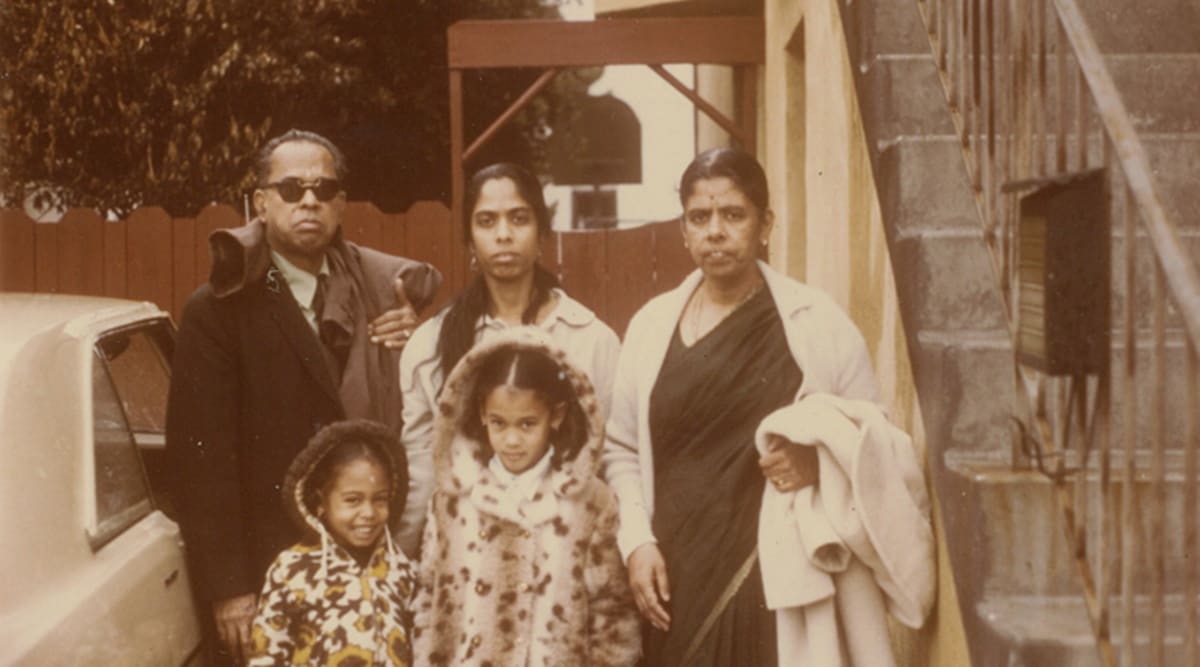 An image provided by the Jode Biden campaign, Sen. Kamala Harris (D-Calif.), front center, with, from left, her grandfather, sister, mother and grandmother in 1972. The Democratic vice-presidential pick gained part of her foundation from her motherÕs side of the family, which defied stereotypes in India and promoted equality for women. (The Joe Biden campaign via The New York Times)-- NO SALES; FOR EDITORIAL USE ONLY WITH NYT STORY INDIA-HARRIS-FAMILY BY JEFFREY GETTLEMAN AND SUHASINI RAJ FOR AUG. 16, 2020. ALL OTHER USE PROHIBITED. --
An image provided by the Jode Biden campaign, Sen. Kamala Harris (D-Calif.), front center, with, from left, her grandfather, sister, mother and grandmother in 1972. The Democratic vice-presidential pick gained part of her foundation from her motherÕs side of the family, which defied stereotypes in India and promoted equality for women. (The Joe Biden campaign via The New York Times)-- NO SALES; FOR EDITORIAL USE ONLY WITH NYT STORY INDIA-HARRIS-FAMILY BY JEFFREY GETTLEMAN AND SUHASINI RAJ FOR AUG. 16, 2020. ALL OTHER USE PROHIBITED. --One of Sen. Kamala Harris’ brightest childhood memories was walking down the beach hand in hand with her Indian grandfather.
Her grandfather, P.V. Gopalan, had served for decades in the Indian government, and his ritual, nearly every morning, was to meet up with his retired buddies and talk politics as they strolled along the beach in Besant Nagar, a seaside neighborhood in Chennai where brightly painted fishing boats line the sand and Hindu temples stare out at the sea. During her visits from the United States, Harris tagged along while the men discussed equal rights, corruption and the direction India was headed.
“I remember the stories that they would tell and the passion with which they spoke about the importance of democracy,” Harris said in a 2018 speech to an Indian-American group. “As I reflect on those moments in my life that have had the most impact on who I am today — I wasn’t conscious of it at the time — but it was those walks on the beach with my grandfather in Besant Nagar that had a profound impact on who I am today.”
Although Harris has been more understated about her Indian heritage than her experience as a Black woman, her path to U.S. vice-presidential pick has also been guided by the values of her Indian-born mother, her Indian grandfather and her wider Indian family who have provided a lifelong support network that endures even from 8,000 miles away.
Her grandfather, wearing Coke-bottle glasses and often a necktie during strolls, may have looked like many other upper-crust Indian gentlemen. But he defied the conservative stereotypes of his era, embodying a progressive outlook on public service and unswerving support for women, especially in terms of their education, that was years ahead of his time.
He instilled great confidence in Harris’ mother, Shyamala Gopalan, who came to America in the late 1950s young and alone and made a career as a breast cancer researcher before dying of cancer in 2009.
Harris remains close to her mother’s side of the family — her aunts and uncle can talk for hours from their homes in India about the bruising battles she has fought in San Francisco, Sacramento or Washington, giving the impression that they had ringside seats.
Her uncle, G. Balachandran, who lives in New Delhi, recalled visiting Harris in California about 15 years ago when she was San Francisco’s district attorney and was taking heat for not seeking the death penalty for a man accused of killing a police officer. She considered the death penalty flawed on many levels, both high-minded and pragmatic: racial inequities being one and the cost of pursuing the cases being another. Despite intense pressure from police officers and some of the top politicians in the state, Harris didn’t back down.
“She got that from her mother,” her uncle said. “Shyamala always taught her: Don’t let anyone push you around.”
During a later race for California attorney general, Harris called her aunt Sarala Gopalan in Chennai and asked her to break coconuts for good luck at a Hindu temple overlooking the beach at Besant Nagar where she used to walk with her grandfather.
The aunt lined up 108 coconuts — an auspicious number in Hinduism — to be smashed. “And it takes a whole day to arrange that,” she said. Harris won the election, by the slimmest of margins.
That beach is now shut. With India hit hard by the coronavirus pandemic and much of the country still locked down, the environs that Harris so fondly remembers are desolate. Last week a few sinewy, shirtless fishermen stood ankle deep in the waves and tugged hand lines, hoping for a fish.
Because of the foreign policy positions Harris has staked out as a senator, she has some detractors in India. But across the country she evokes enormous pride, particularly in the beachside community where she traces her roots.
“That family had an immaculate reputation,” said N. Vyas, a retired doctor who was their upstairs neighbor. “They never raved about the great things that they have done in Delhi or something like that. They were straight-shooters — down-to-earth, happy people.”
Vyas’ wife, Jayanti, who is also a retired doctor and who was leaning in the doorway, shook her head with a knowing smile.
“We are not surprised,” she said of Harris’ being named the first woman of color on the presidential ticket of a major U.S. party.
“See, all the women in her family are strong personalities,” she said. “These are women who know what they are talking and what they are saying.”
The Gopalan story started in a small village south of Chennai called Painganadu, where Harris’ grandfather was born in 1911. In terms of India’s caste system, the family was at the top of the heap. They were Tamil Brahmins, an elite subculture known as TamBrahms.